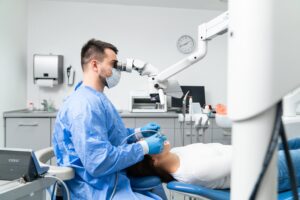
You don’t necessarily have to be interested in a career in dentistry to benefit from a working knowledge of dental vocabulary. While a dental assistant or administrative worker would certainly want to understand a broad range of common dental terms, the average dental patient can also intelligently guide and significantly improve their overall quality of care by familiarizing themselves with the basic language of dental medicine.
Exploring 10 Essential Dental Terms
What is dental terminology? This may depend on your specific interests or areas of specialization within the dental field — but you simply can’t go wrong by adding the following 10 dental terms to your dental administrator or dental assistant vocabulary.
1. Tooth Restoration: Reviving Your Smile
Restorative dentistry revolves around the restoration (repair or replacement) of damaged or missing teeth. The most common form of tooth restoration is cavity filling, which fills a hollow area in a tooth to ensure its structural integrity. Other common types of tooth restoration include the crown (a prosthetic appliance that replaces all or part of a natural tooth) and the veneer (a thin layer that covers the surface of a natural tooth). Dentures, bridges, and tooth bonding are also tooth restoration options.
2. Orthodontics: Straightening Out the Facts
Like many medical and dental terms, orthodontics has Greek origins. The prefix “ortho-” means “straight” or “correct,” and the suffix “-odont” is Greek for “tooth.” True to its name, then, orthodontics is the field of dentistry focused on straightening teeth and correcting abnormal tooth growth. Over the years, orthodontists have used a variety of techniques to straighten and correct teeth, but the two most common are braces and retainers. Today, invisible teeth aligners are becoming increasingly popular among adults as well.
3. Periodontics: Beyond the Gums
“Perio-” is Greek for “around” or “support.” Periodontists specialize in the gums, which surround and sustain the teeth. One of the primary goals of periodontists is to fight gum
disease (periodontitis), a leading cause of tooth loss. To accomplish this goal, these professionals may recommend a range of non-invasive or surgical treatment options.
4. Endodontics: Rooting for Dental Health
Endodontics is a specialized field of dentistry that focuses on root canals and other therapies that treat the soft tissue within a tooth. Aptly, “endo-” is the Greek prefix for “inside.” Like periodontics, endodontics can help patients keep their natural smiles.
5. Prosthodontics: Rebuilding Smiles
Modern tooth restoration would be impossible without the field of prosthodontics. “Prostho-” means “replacement,” and “prosthodontics” involves the replacement of missing teeth with dental appliances. Beyond removable dentures, crowns and bridges are the most common prosthetic dental appliances. So are the dental implants that keep crowns and bridges anchored.
6. Esthetic Dentistry: The Art of the Smile
Otherwise known as cosmetic dentistry, esthetic dentistry concentrates on dental treatments that specifically aim to improve the appearance of the teeth. Some procedures (such as teeth whitening) are purely esthetic. However, tooth restoration, prosthodontics, and esthetic dentistry are inseparable from one another in many cases; for example, veneers often improve both the look and the structural integrity of teeth.
7. Oral Surgery: When Dentistry Goes Deeper
When less invasive treatment options are insufficient, oral surgery can address any number of conditions that affect the teeth, gums, and jaws. Some of the most common oral surgical procedures include tooth extraction, dental implants, periodontal surgery, and dental bone grafts.
8. Maxillofacial Surgery: The Interface of Dentistry and Medicine
Beyond oral surgeries affecting the teeth, gums, and jaws, maxillofacial surgery can address a wide range of conditions that impact the mouth, jaws, neck, and face. Patients choosing between oral or maxillofacial surgery must consider their unique needs. While oral surgeons commonly remove impacted wisdom teeth, a maxillofacial surgeon may be necessary if more serious or widespread mouth issues are discovered. Maxillofacial surgeons hold a combination of dental and medical qualifications.
9. Pediatric Dentistry: Caring for Young Smiles
A specialized field of dentistry focused on the treatment of children, pediatric dentistry requires specialized training in dental conditions that primarily affect youth as well as treatment techniques geared specifically toward children.
10. Understanding the Specialties: An Overview
Dentists can specialize in all the areas outlined above plus numerous others. For example, oral pathologists diagnose and treat oral diseases, dental anesthesiologists provide patient sedation and pain relief, and dental public health professionals promote community dental health.
Advancing Your Dental Administration Career in Ontario
Rewarding careers are available to individuals with a firm understanding of the fundamental dental concepts. You can expand your professional horizons as a dental office administrator in Ontario and beyond by completing educational programs through Medix Online, or explore the Ontario labor market for various roles. From its headquarters in Toronto, Medix has been providing high-quality dental training for decades, allowing you to choose the best program for your career ambitions.
Navigating the Dental Industry Landscape
Dental administrators would benefit from mastering a mix of technical, interpersonal, and business skills to thrive in today’s industry. Pursuing a career in the dental field requires a strong command of clinical fundamentals along with exceptional communication skills. After all, you will need to use quite different communication techniques when dealing with different patients, mentors, and colleagues.
Essential Skills for Aspiring Dental Administrators
Beyond strategic communication, aspiring dental administrators must be professionally flexible and pleasantly approachable, with strong customer service skills. They should also possess a positive work ethic — with effective organizational and time management skills as well as a dedicated attention to detail. Proficiency with modern dental software, financial management, billing and regulatory knowledge, and patient retention strategies may also be crucial.
Frequently Asked Questions
What qualifications are needed for a career in dental administration in Ontario?
While some Ontario dental offices only require a high school diploma for their entry-level administrative positions, many prefer job candidates with advanced degrees or relevant
program certificates. At the very least, specialized training can help you stand out from your competitors in the job market.
How can I improve my dental terminology knowledge effectively?
The best way to boost your understanding of dental terminology is to complete a targeted degree or certificate program in your chosen corner of the dental profession. Many courses are designed to deliver the exact training that you need without costing you excessive money or time.
How does knowledge of dental terms impact patient care?
Misunderstandings can cause major problems in virtually any industry. In the dental office, even a small error in communication can have an enormous impact on overall patient health. Therefore, a solid understanding of dental terms is essential among all workers in the dental field.
What is the common terminology for dental cavities?
As a dental term, “cavity” can technically refer to any missing internal tooth structure that can be caused by factors ranging from erosion to abrasion. The most common reason for a dental cavity is caries (tooth decay). A cavity caused by caries is technically called a “carious lesion.” The nuanced differences among the terms “cavity,” “caries,” and “carious lesion” illustrate the significant professional need for dental terminology training.
Pursue Dental Terminology With Medix Online
The highly targeted dental terminology program through Medix Online is specifically designed for learners and professionals who want to expand their dental vocabulary by gaining a firm command of specialized dental terms. Learn more about this program and request additional information today.




